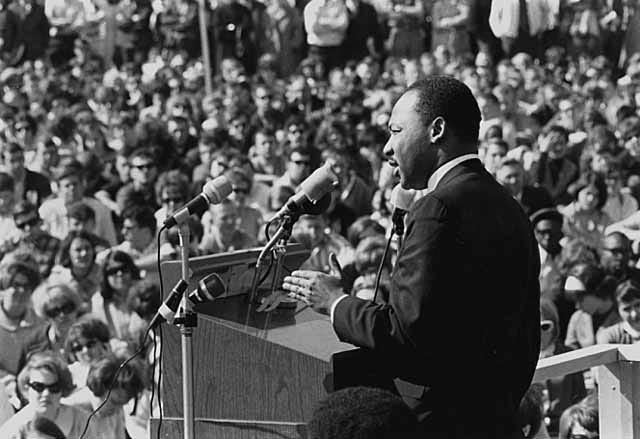The Almanac - Issue No. 3
A note on what Dr. Martin Luther King Jr. actually preached.

This week’s almanac is an attempt to put King’s work in its appropriate context with a speech considered to be key to his ideology. “Beyond Vietnam” is a sprawling indictment of American imperialism, systemic racism, and disregard for the impoverished—three arms that King aptly identified as belonging to the same beast—as well as an assessment of the U.S. government’s priorities. During his time in front of Riverside’s congregation, King challenged the widely held view that the desire for peace abroad and the fight for civil rights at home were separate movements. You can read the speech in full here, but I’ve clipped two sections for your viewing. I hope you walk away picking up what King was actually putting down.
Beyond Vietnam
The Gist:
Over the past two years, as I have moved to break the betrayal of my own silences and to speak from the burnings of my own heart, as I have called for radical departures from the destruction of Vietnam, many persons have questioned me about the wisdom of my path. At the heart of their concerns, this query has often loomed large and loud: "Why are you speaking about the war, Dr. King?" "Why are you joining the voices of dissent?" "Peace and civil rights don’t mix," they say. "Aren’t you hurting the cause of your people?" they ask. And when I hear them, though I often understand the source of their concern, I am nevertheless greatly saddened, for such questions mean that the inquirers have not really known me, my commitment, or my calling. Indeed, their questions suggest that they do not know the world in which they live.
The Nutgraf:
Finally, as I try to explain for you and for myself the road that leads from Montgomery to this place, I would have offered all that was most valid if I simply said that I must be true to my conviction that I share with all men the calling to be a son of the living God. Beyond the calling of race or nation or creed is this vocation of sonship and brotherhood. Because I believe that the Father is deeply concerned especially for His suffering and helpless and outcast children, I come tonight to speak for them. This I believe to be the privilege and the burden of all of us who deem ourselves bound by allegiances and loyalties which are broader and deeper than nationalism and which go beyond our nation’s self-defined goals and positions. We are called to speak for the weak, for the voiceless, for the victims of our nation, for those it calls "enemy," for no document from human hands can make these humans any less our brothers.
And as I ponder the madness of Vietnam and search within myself for ways to understand and respond in compassion, my mind goes constantly to the people of that peninsula. I speak now not of the soldiers of each side, not of the ideologies of the Liberation Front, not of the junta in Saigon, but simply of the people who have been living under the curse of war for almost three continuous decades now. I think of them, too, because it is clear to me that there will be no meaningful solution there until some attempt is made to know them and hear their broken cries.


